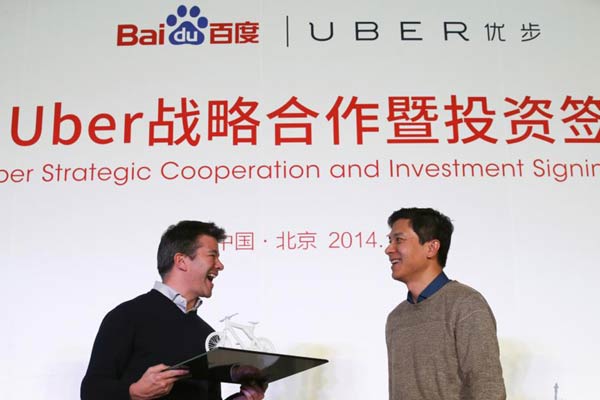 |
|
Uber CEO Travis Kalanick (L) smiles after receiving a gift from Baidu Inc Chairman and CEO Robin Li after signing their documents during the Baidu and Uber strategic cooperation and investment signing ceremony at Baidu's headquarters in Beijing Dec 17, 2014. [Photo/Agencies] |
US-based company charts plans to wrest market share from Chinese competitors, reports Meng Jing.
The record shows that most of the overseas Internet giants stumble in China no matter how big their names are in their home markets.
To increase the odds of success in China's huge and rapidly growing Internet market, Uber Technologies Inc has teamed up with Internet heavyweight Baidu Inc in a strategic cooperation that would help the United States-based company gain ground in the country's highly competitive car-hailing business.
The Beijing-based Baidu signed an agreement to buy a stake in Uber, which has a valuation of $40 billion. The exact amount of the investment was not released at the signing ceremony in Baidu's headquarters on Wednesday. However, previous media reports have indicated that it could be a capital injection of $600 million.
The deal between Baidu and Uber, which offers services in 230 cities worldwide but was not launched in China until February, is the latest marriage between a Chinese Internet giant and a car-hailing service provider.
Both of Baidu's rivals-Alibaba Group Holding Ltd and Tencent Holdings Ltd-have invested in the taxi-hailing business. Kuaidi Dache, which is backed by Alibaba, and Didi Dache, which is backed by Tencent, have dominated the Chinese market with a combined market share of more than 99 percent in the third quarter of the year, said a recent report from Internet consultancy Analysys International.
Despite the clear challenge from well-established rivals, Robin Li, chief executive officer of Baidu, said the Internet-enabled transportation market is still in a nascent stage in China.
"Baidu's goal in the mobile Internet era is to connect people with services. And Uber, which has reshaped the traditional transportation market in the West, can help us achieve that goal," said Li, adding Baidu will team up with Uber in technology innovation, online-to-offline expansion in China and global market expansion.
The matching point between Baidu and Uber in the car-hailing business lies in the mobile Baidu Map, a map application that has 70 percent of China's mobile map market, said Li. Apart from integrating into Baidu Map, the cooperation is expected to offer Uber some data generated by the large user base of Baidu, the No 1 search engine in the country.
Travis Kalanick, founder and chief executive officer of Uber, is confident about Uber's future in China. He said that Chinese consumers are huge adopters of the latest Internet trends, such as online-to-offline business, which allow people to pay online but have real life experience offline.
"Hundreds of millions of people open Baidu Map every day to plan their next journey. The cooperation brings our commitment to the China market to a whole new level," he said.
According to Kalanick, the growth momentum of Uber's business in China is faster than its overall business growth worldwide. Uber offers services in nine Chinese cities and most of them are first-tier cities in developed regions, while its Chinese competitors Didi Dache and Kuaidi Dache operate in more than 300 cities.
Both Baidu and Uber believe they can achieve a win-win result, but some analysts remain doubtful on whether the tie-up would help Uber make a breakthrough in China's highly competitive car-hailing sector.